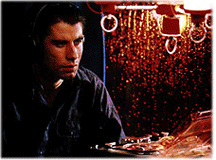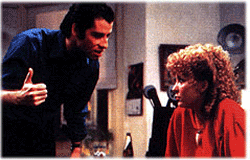|
Newest Reviews:
New Movies -
The Tunnel
V/H/S
The Tall Man
Mama Africa
Detention
Brake
Ted
Tomboy
Brownian Movement
Last Ride
[Rec]≥: Genesis
Hara-Kiri: Death of a Samurai
Indie Game: The Movie
Abraham Lincoln: Vampire Hunter
Old Movies -
Touki Bouki: The Journey of the Hyena
Drums Along the Mohawk
The Chase
The Heiress
Show
People
The Strange Affair of Uncle Harry
Pitfall
Driftwood
Miracle Mile
The Great Flamarion
Dark Habits
Archives -
Recap: 2000,
2001, 2002,
2003, 2004
, 2005, 2006,
2007 , 2008
, 2009 ,
2010 , 2011 ,
2012
All reviews alphabetically
All reviews by star rating
All reviews by release year
Masterpieces
Screening Log
Links
FAQ
E-mail me
HOME
| |
Blow Out (Brian De Palma) 1981
 Brian De Palmaís movies are a
stunningly uneven lot, but that might just be because he takes as many risks as
he does. Few directors are as capable of him when it comes to delivering films
that are opposite ends of the quality spectrum. His best? Sisters. His worst? Mission to
Mars. The odd thing is that itís not as if either feels like an isolated
incident in his career. Each De Palma movie feels as if it could be the best
thing ever made or the worst, and itís not until about halfway through
watching one for the first time that you get a firm grasp on which way the new
one will tilt. I understand his
political thriller Blow Out is an
extended tribute to Antonioniís Blowup
(which I have not seen), but it seems to owe as much to Hitchcock as any of his
ďofficialĒ Hitch-homage does. Certainly the bravado opening sequence seems
to throw more at us than most can handle, referencing Psycho, The Rear Window,
and Rope, among others, under the
guise of a B-grade horror film. The self-depreciating tone that De Palma
(essentially equating himself with that hack director) has here goes a long way
toward keeping the movie from feeling self-important, even though it has every
right to be that way due to its quality. Blow
Out is brilliant homage that doesnít just appropriate, but instead extends
the themes of the original.
Brian De Palmaís movies are a
stunningly uneven lot, but that might just be because he takes as many risks as
he does. Few directors are as capable of him when it comes to delivering films
that are opposite ends of the quality spectrum. His best? Sisters. His worst? Mission to
Mars. The odd thing is that itís not as if either feels like an isolated
incident in his career. Each De Palma movie feels as if it could be the best
thing ever made or the worst, and itís not until about halfway through
watching one for the first time that you get a firm grasp on which way the new
one will tilt. I understand his
political thriller Blow Out is an
extended tribute to Antonioniís Blowup
(which I have not seen), but it seems to owe as much to Hitchcock as any of his
ďofficialĒ Hitch-homage does. Certainly the bravado opening sequence seems
to throw more at us than most can handle, referencing Psycho, The Rear Window,
and Rope, among others, under the
guise of a B-grade horror film. The self-depreciating tone that De Palma
(essentially equating himself with that hack director) has here goes a long way
toward keeping the movie from feeling self-important, even though it has every
right to be that way due to its quality. Blow
Out is brilliant homage that doesnít just appropriate, but instead extends
the themes of the original.
 The eventual plot of the movie follows John Travolta as Jack, a
sound-effects technician who witnesses an accident, setting off a series of
events. The way that De Palma stages not only this accident but Jackís
perception of it is masterful. By the end of the film, through a series of set
pieces that not only demonstrate the art of filmmaking, but also the fakery
behind that art, we come to completely understand the elements of the accident.
The film is incredible because it is so adept at conveying the connections and
suspicions that float through its protagonistís mind. Weíre right there with
Jack as he gets in too deep, so things feel a lot less silly and a lot more
immediate than they might otherwise. Thereís nothing thatís opaque or obtuse
about Jackís descent into paranoia. The plot and acting are almost secondary
as De Palma uses his considerable technical prowess to continually thrill us. As
Jack splices soundtracks and De Palma tracks his camera across a very lively
Philadelphia, we come to realize how much work has been put into creating that
thrill. Even though thereís less humor here than in the usual De Palma movie,
thereís a definite giddying effect as he creates a movie that plays the
audience so well that itís almost interactive. The feeling that itís all
been a bit of a game makes the surprisingly guileless emotional impact of the
denouement all the more impressive. As one of the directorís finest
achievements, Blow Out proves that
great movie fun and great movies are not mutually exclusive.
The eventual plot of the movie follows John Travolta as Jack, a
sound-effects technician who witnesses an accident, setting off a series of
events. The way that De Palma stages not only this accident but Jackís
perception of it is masterful. By the end of the film, through a series of set
pieces that not only demonstrate the art of filmmaking, but also the fakery
behind that art, we come to completely understand the elements of the accident.
The film is incredible because it is so adept at conveying the connections and
suspicions that float through its protagonistís mind. Weíre right there with
Jack as he gets in too deep, so things feel a lot less silly and a lot more
immediate than they might otherwise. Thereís nothing thatís opaque or obtuse
about Jackís descent into paranoia. The plot and acting are almost secondary
as De Palma uses his considerable technical prowess to continually thrill us. As
Jack splices soundtracks and De Palma tracks his camera across a very lively
Philadelphia, we come to realize how much work has been put into creating that
thrill. Even though thereís less humor here than in the usual De Palma movie,
thereís a definite giddying effect as he creates a movie that plays the
audience so well that itís almost interactive. The feeling that itís all
been a bit of a game makes the surprisingly guileless emotional impact of the
denouement all the more impressive. As one of the directorís finest
achievements, Blow Out proves that
great movie fun and great movies are not mutually exclusive.
* * * *
01-07-02
Jeremy Heilman
|